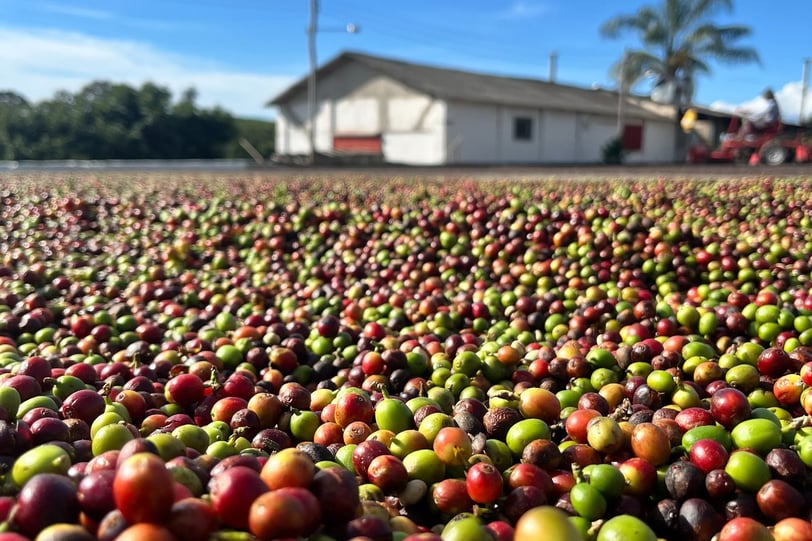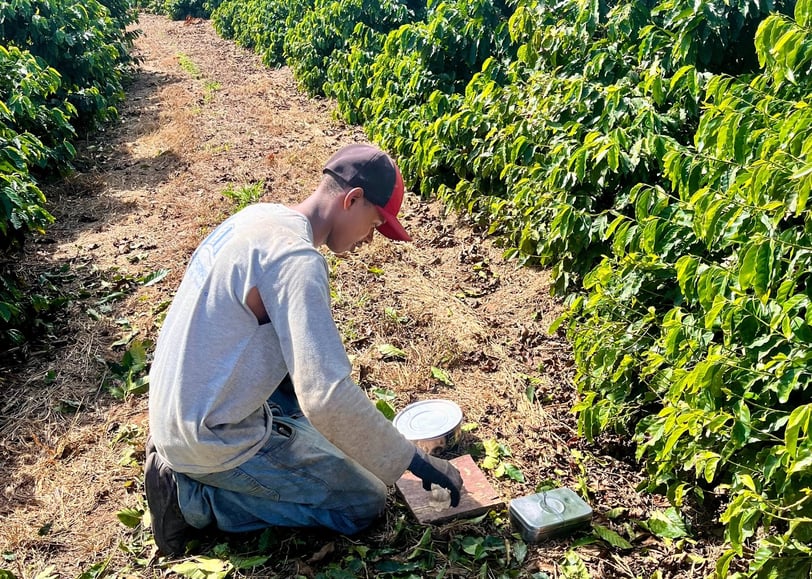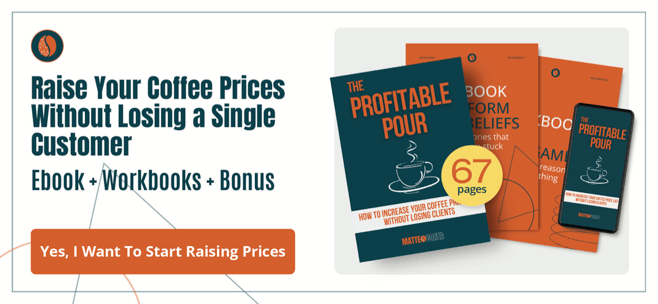People or Profit: What I Learned from farmers in Brazil
COFFEE MARKETGROWTH
The hills of Minas Gerais stretched endlessly into the darkness, waves of coffee plants dancing in the cool night breeze. The old farmhouse sat like a guardian over the plantation, its thick walls holding decades of stories, struggles, and stubborn hope.
Inside, the kitchen was the heart of everything. Massive wooden beams crossed the ceiling, and those traditional wood-burning stoves filled every corner with the rich scent of burning charcoal—a smell that gets into your clothes, your hair, your memory, and refuses to leave.
My travel companions and I had been invited to share dinner with Tais and her family. The table was simple, the food was honest, and the conversation started light. But as the evening deepened and the last plates were cleared away, something shifted.
Tais poured coffee from her own plantation—a ritual that felt both ordinary and sacred. The cups were small, the coffee was perfect, and her hands moved with the practiced grace of someone who had done this thousands of times. But her eyes carried a weight that spoke of battles fought every single day.
"You want to know what it's really like?" she said, settling back in her chair as the crickets began their nightly symphony outside. "Everyone talks about passion for coffee, about tradition, about quality. But every morning I wake up and I have to choose."
She gestured toward the window, beyond which her family's coffee trees stood invisible in the darkness. "My parents planted those trees believing in the future. They believed that good coffee, honest work, and treating people right would be enough. I'm still trying to figure out if that future they believed in actually exists."
The room fell quiet except for the crackling of the wood stove. Tais spoke only Portuguese, but some truths need no translation. In her voice, I heard something I recognized—the same question that haunts every level of our industry, from the smallest farm to the biggest roastery.
"Every day I choose," she continued, her voice steady but tired. "Do I bow to the cooperatives that offer me pennies for my coffee? Do I accept that my quality doesn't matter because the market only cares about cheap prices? Or do I keep fighting for something better, even when it feels impossible?"
In that moment, sitting at that kitchen table surrounded by the smell of wood smoke and the sound of crickets, I realized that Tais wasn't just talking about her farm. She was describing the exact same war that every single one of us in the coffee industry faces every single day.


The Universal Duality: People vs. Profit at Every Level
What Tais described that night wasn't unique to small Brazilian farmers. It's the same invisible war being fought in every corner of our industry—a silent battle that cuts through the entire supply chain like a fault line waiting to crack.
At Origin: The Farmer's Dilemma
Walk through any coffee-growing region and you'll find the same story playing out in different languages. Small producers caught between their commitment to quality and the brutal economics of survival. Some, like Tais, refuse to compromise. They invest in better processing, they pay fair wages to their workers, they focus on cup scores instead of volume. But they pay a price—smaller profits, constant financial stress, and the daily uncertainty of whether their quality will ever truly be valued by the market.
Others make a different choice. They sell to whoever pays fastest, accept whatever price is offered, and focus purely on quantity. It's not because they don't care about quality—it's because they have families to feed and bills to pay. The market has taught them that survival matters more than excellence.
The Roaster's Crossroads
Move up the chain and the same duality emerges in different clothing. I've seen brilliant roasters with incredible palates slowly transform into commodity buyers because the pressure to compete on price became unbearable. They start cutting corners—cheaper green coffee, faster turnaround times, larger batches that sacrifice precision for efficiency.
Then there are those who take the harder path. They pay premium prices for exceptional coffee, they invest time in building relationships with farmers, they educate their customers about what quality actually means. But this choice demands courage. It means saying no to customers who only care about price. It means accepting smaller market share in exchange for authentic value creation.
The Coffee Shop Reality
At the retail level, the battle intensifies. Coffee shop owners face the daily choice between investing in their people or protecting their margins. Do you spend money training your baristas to understand coffee, to create genuine experiences for customers? Or do you hire whoever's cheapest and focus on speed and volume?
I've watched talented baristas become order-taking machines because their employers decided that efficiency mattered more than expertise. And I've seen other shops where owners choose to pay higher wages, invest in continuous education, and create environments where both staff and customers can actually connect with coffee as something meaningful.
The Consumer's Vote
Even consumers cast this same vote every day, often without realizing it. When you choose the cheapest option, when you treat coffee as a commodity rather than a craft, when you prioritize convenience over quality, you're voting for a system that values profit over people.
But when you choose to pay fair prices, when you seek out roasters who invest in farmer relationships, when you support coffee shops that treat their staff well—you're voting for something different.
The Question That Connects Us All
Whether you're a farmer in Brazil, a roaster in Europe, or a barista in North America, you wake up every day facing the same fundamental choice: What matters more to you: people or profit?
The tragedy is that we've been conditioned to believe these are mutually exclusive. That caring about people means sacrificing business success. That putting profit first is just "being realistic."
But sitting at Tais' table, listening to her story, I realized this is the biggest lie our industry tells itself.


The Hidden Cost of the Commodity Mindset
Here's what the commodity mindset actually costs us—and the numbers might surprise you.
The Farmer's Trap
When farmers are forced to compete purely on price, they enter a death spiral that destroys value for everyone. They can't invest in better processing equipment, so cup quality stagnates. They can't pay workers fairly, so they lose experienced labor during crucial harvest periods. They can't focus on sustainability practices, so soil quality degrades over time.
The result? Coffee that gets progressively worse while demanding the same low prices. Eventually, these farmers either abandon coffee production entirely or sell their land to developers. We lose not just their current production, but decades of accumulated knowledge and terroir that can never be replaced.
The Roaster's Race to Mediocrity
Roasters caught in price competition face similar destruction of value. They source cheaper green coffee, which means more defects, more inconsistency, and more time spent trying to make bad coffee taste acceptable. They reduce quality control to cut costs, leading to more customer complaints and returns.
But the real killer is what happens to their team. When you can't afford to pay competitive wages, you lose your best people to competitors. When you can't invest in training, your remaining staff can't grow. When you're constantly stressed about margins, you create a workplace culture focused on fear rather than excellence.
The irony? These roasters often end up spending more money than their quality-focused competitors—more time fixing problems, more coffee wasted on failed batches, more energy dealing with unhappy customers, more turnover costs from constantly hiring new staff.
The Coffee Shop's False Economy
Coffee shops that compete purely on price face the most visible destruction. They serve mediocre coffee to customers who don't understand why they should care. They hire inexperienced staff who can't create meaningful customer experiences. They create environments that feel transactional rather than welcoming.
These businesses become trapped in a cycle where they can't charge premium prices because they don't deliver premium value, but they can't deliver premium value because they can't afford to invest in the things that create it—better coffee, trained staff, thoughtful service.
The Industry-Wide Damage
When commodity thinking dominates, it creates a downward spiral that hurts everyone:
Farmers stop investing in quality because the market doesn't reward it
Roasters become order-takers rather than coffee craftspeople
Baristas become button-pushers rather than beverage artists
Customers never learn to appreciate what great coffee can be
The entire industry becomes stuck in a race to the bottom, where everyone works harder for less money while delivering increasingly mediocre experiences.
The Consumer Education Crisis
Perhaps the most devastating long-term cost is that commodity thinking prevents consumer education. When the market focuses only on price and convenience, customers never learn to distinguish between good coffee and great coffee. They never understand the skill required to produce exceptional coffee or the value chain that makes it possible.
This creates a vicious cycle: uninformed customers don't demand quality, so businesses don't invest in it, so customers never experience what they're missing.
The Real Price of "Efficiency"
The commodity mindset promises efficiency, but delivers the opposite. When you optimize only for short-term cost reduction, you create systems that are incredibly inefficient at generating lasting value.
You spend enormous energy fighting for tiny margins instead of building sustainable competitive advantages. You constantly struggle with quality issues instead of preventing them. You deal with high turnover instead of building experienced teams. You compete for price-sensitive customers instead of developing loyal relationships.
Breaking the Cycle
The good news? This isn't inevitable. There's another way to build a coffee business—one that creates value instead of destroying it, that builds relationships instead of transactions, that treats coffee as a craft worthy of respect rather than a commodity to be traded.
But it requires courage to reject the false choice between people and profit.
The Alternative Path: When People-First Becomes Profit-Smart
The most successful coffee businesses I know have figured out something that sounds almost too simple to be true: when you put people first, profit follows naturally.
This isn't feel-good philosophy. It's strategic business thinking that creates sustainable competitive advantages your competitors can't copy.
The Farmer's Quality Revolution
Look at farmers who've chosen the people-first path. They pay their workers above-market wages, invest in proper housing and healthcare, and create working conditions that attract and retain experienced labor. The immediate result? Better cherry selection, more careful processing, and consistently higher cup scores.
But the long-term advantages are even more powerful. These farmers develop reputations that allow them to build direct relationships with quality-focused roasters. They can command premium prices not because they're lucky, but because they've systematically built the infrastructure to deliver exceptional coffee.
I know farmers who've increased their revenue by 300% over five years—not by producing more coffee, but by producing better coffee and building relationships with buyers who value that quality. Their investment in people created a foundation for sustainable growth that no commodity producer can replicate.
The Roaster's Relationship Advantage
Quality-focused roasters who invest in farmer relationships create multiple competitive advantages simultaneously. They secure access to exceptional green coffee that isn't available on the commodity market. They can tell authentic origin stories that resonate with customers. They build supply chain stability that protects them from market volatility.
More importantly, their investment in people—both at origin and within their own teams—creates institutional knowledge that becomes incredibly valuable over time. Experienced roasters develop palates and technical skills that take years to build. Educated sales teams can actually sell coffee's value rather than just competing on price.
These businesses often operate with higher gross margins than their commodity-focused competitors, even while paying more for green coffee and wages. Why? Because they're selling value, not just caffeine.
The Alternative Path: When People-First Becomes Profit-Smart
The most successful coffee businesses I know have figured out something that sounds almost too simple to be true: when you put people first, profit follows naturally.
This isn't feel-good philosophy. It's strategic business thinking that creates sustainable competitive advantages your competitors can't copy.
The Farmer's Quality Revolution
Look at farmers who've chosen the people-first path. They pay their workers above-market wages, invest in proper housing and healthcare, and create working conditions that attract and retain experienced labor. The immediate result? Better cherry selection, more careful processing, and consistently higher cup scores.
But the long-term advantages are even more powerful. These farmers develop reputations that allow them to build direct relationships with quality-focused roasters. They can command premium prices not because they're lucky, but because they've systematically built the infrastructure to deliver exceptional coffee.
I know farmers who've increased their revenue by 300% over five years—not by producing more coffee, but by producing better coffee and building relationships with buyers who value that quality. Their investment in people created a foundation for sustainable growth that no commodity producer can replicate.
The Roaster's Relationship Advantage
Quality-focused roasters who invest in farmer relationships create multiple competitive advantages simultaneously. They secure access to exceptional green coffee that isn't available on the commodity market. They can tell authentic origin stories that resonate with customers. They build supply chain stability that protects them from market volatility.
More importantly, their investment in people—both at origin and within their own teams—creates institutional knowledge that becomes incredibly valuable over time. Experienced roasters develop palates and technical skills that take years to build. Educated sales teams can actually sell coffee's value rather than just competing on price.
These businesses often operate with higher gross margins than their commodity-focused competitors, even while paying more for green coffee and wages. Why? Because they're selling value, not just caffeine.
The Coffee Shop's Experience Economy
The most profitable coffee shops I've encountered aren't necessarily the busiest ones. They're the ones that create experiences worth paying for.
When you invest in training your baristas, something magical happens. They don't just make better coffee—they become ambassadors for your brand. They can explain why your coffee tastes different, educate customers about brewing methods, and create personal connections that turn one-time visitors into regular customers.
These businesses charge premium prices not because they're greedy, but because they deliver premium value. Their customers don't see coffee as a commodity transaction—they see it as a craft experience worth seeking out and paying for.
The Technology of Relationships
Here's what most businesses miss: relationships are a technology. They're systems that create predictable, scalable results.
When you invest in long-term relationships with farmers, you create supply chain predictability. When you invest in your team's development, you create operational consistency. When you invest in customer education, you create demand for quality rather than just quantity.
These relationship technologies compound over time. Every year you invest in them, they become more valuable and harder for competitors to replicate.
The Authenticity Advantage
In an age where consumers are increasingly skeptical of corporate messaging, authenticity has become the ultimate competitive advantage. But authenticity can't be faked—it has to be earned through consistent actions over time.
Businesses that genuinely put people first develop authentic stories that resonate because they're true. Their customers can taste the difference in their coffee. Their employees genuinely believe in what they're doing. Their suppliers trust them because they've proven their commitment through actions, not just words.
This authenticity creates customer loyalty that's incredibly resistant to price competition. When customers believe in what you're doing, they become advocates for your business rather than just consumers of your products.
The Innovation Catalyst
Perhaps most surprisingly, putting people first actually accelerates innovation rather than slowing it down.
When farmers aren't desperate for immediate cash flow, they can experiment with new processing methods. When roasters aren't constantly worried about margins, they can invest time in developing new flavor profiles. When baristas feel valued and educated, they contribute ideas that improve operations.
The coffee industry's most significant innovations have come from businesses that had the stability and vision to invest in people and relationships rather than just chasing quarterly numbers.
The Long-Term Math
Yes, putting people first requires higher upfront investment. You pay more for green coffee, more for wages, more for training, more for equipment. But the long-term math is incredibly compelling.
Higher customer retention. Higher average transaction values. Lower marketing costs because satisfied customers do your marketing for you. Lower turnover costs because good employees stay. Higher operational efficiency because experienced teams make fewer mistakes.
Most importantly, you build a business that can grow sustainably because it's built on value creation rather than cost cutting.
Why This Path Remains Uncommon
If people-first business strategies are so effective, why doesn't everyone adopt them?
Because they require patience, courage, and a longer-term perspective than most businesses are willing to commit to. They require saying no to customers who only care about price. They require investing money before you can measure the return. They require believing that quality and relationships matter even when market conditions suggest otherwise.
But for those willing to take this path, the rewards extend far beyond profit.


My Declaration: Drawing the Line
Sitting at that kitchen table in Minas Gerais, listening to Tais' story while the coffee plants whispered in the darkness outside, something crystallized for me. All the conversations I'd had with struggling roasters, all the talented baristas I'd seen burning out, all the compromise decisions I'd watched people make in the name of "being realistic"—they all led back to the same fundamental choice.
The Moment of Clarity
I've spent over twenty years in this industry. I've worked every angle—production, export, marketing, consulting. I've seen the best and worst of what we're capable of. But in that moment with Tais, I realized I'd been dancing around the edge of a truth I wasn't ready to fully embrace.
Every business challenge we face, every ethical dilemma we encounter, every moment when we feel like we're compromising our values—it all comes down to that same question she posed: What matters more to you? People or money?
The Choice That Changes Everything
I've made my choice. It's not a choice I made that night in Brazil—it's a choice I've been making incrementally for years. But Brazil crystallized it, made it impossible to ignore or rationalize away.
I will no longer work with, collaborate with, or do business with people or companies that treat profit as more important than the human beings who make that profit possible.
This isn't a marketing statement. This isn't positioning. This is the filter through which every decision in my professional life will now pass.
What This Actually Means
This declaration sounds dramatic, but the reality is more nuanced. I'm not transforming overnight into some impossible idealist who refuses to acknowledge business realities. I'm not going to fire clients tomorrow or blow up partnerships next week.
What I'm doing is setting a compass that will guide every decision moving forward. Some changes will be immediate—I'll stop taking on clients whose values clearly conflict with mine. Others will take time and strategy—realigning existing relationships, building new partnerships that reflect these priorities, gradually reshaping my professional ecosystem.
The direction is set, and it's irreversible. But the journey will be measured and thoughtful.
The Personal Stakes
This isn't just about business ethics. It's about identity. I refuse to become someone who talks about values while acting purely on financial incentives. I refuse to build a career that requires me to compartmentalize my conscience.
I've watched too many talented people in our industry lose themselves chasing numbers that don't reflect what they actually care about. I've seen brilliant roasters become commodity traders. I've seen passionate coffee shop owners become efficiency-obsessed managers who've forgotten why they fell in love with coffee in the first place.
The cost of compromising your values isn't just ethical—it's existential. You become a stranger to yourself.
The Warning to My Circle
To those close to me—business partners, collaborators, clients—this is both an invitation and a warning.
If you share this vision, if you believe that business can be both profitable and human, if you're willing to choose long-term value creation over short-term exploitation, then our relationship just got stronger. We're building something together that matters.
If you're not there yet, if you think this is idealistic nonsense, if you believe that "business is business" and human considerations are secondary luxuries—then we need to have an honest conversation about whether we're still aligned.
I'm not interested in changing anyone's mind. I'm interested in working with people who already understand that the choice between people and profit is a false dilemma created by systems that benefit from keeping us divided.
The Ripple Effect
This declaration isn't just about my business. It's about the industry I want to help create. Every business that chooses people over pure profit makes it easier for the next business to make the same choice. Every farmer who gets paid fairly makes it more likely that other farmers will demand fair treatment. Every roaster who educates customers rather than just serving them creates space for other roasters to compete on quality rather than price.
We change the industry one relationship at a time, one business decision at a time, one refusal to compromise at a time.
The Freedom of Clarity
There's something incredibly liberating about drawing this line. It eliminates entire categories of opportunities that would have required me to rationalize away my values. It simplifies decision-making because the framework is clear. It attracts the right people and repels the wrong ones.
Most importantly, it ensures that the business I build will actually represent who I am rather than forcing me to become someone else to fit my business.
The Invitation
This isn't a manifesto for everyone. It's an invitation to those who are ready.
Ready to build businesses that create value for people, not just extract it from them. Ready to compete on quality and relationships rather than just price and efficiency. Ready to treat coffee as a craft worthy of respect rather than a commodity to be optimized.
If you're ready for that conversation, welcome to my world. If you're not, I wish you well on whatever path you choose.
But I won't pretend the choice doesn't matter. Because after sitting at Tais' table, listening to her story, feeling the weight of what we're all part of, I know it's the only choice that lets me sleep peacefully at night.
Your Turn: The Questions That Matter
Reading about my experience with Tais and my declaration might resonate with you, or it might feel like idealistic nonsense. Either reaction is fine—but before you dismiss this or embrace it, I want you to do something for yourself.
The Mirror Exercise
Find a quiet moment. Put down your phone, close your laptop, and ask yourself these questions with complete honesty:
When you make business decisions, what drives them? Are you primarily motivated by what will make the most money in the shortest time? Or are you considering the impact on the people involved—your employees, your suppliers, your customers, your community?
What compromises are you making right now? Where are you accepting situations that don't align with your values because they seem financially necessary? What are you tolerating that you wouldn't want your best friend to tolerate?
If money wasn't a constraint, what would you change about your business tomorrow? Your answer will reveal what you actually value versus what you think you can afford to value.
The Value Inventory
Make a list of your non-negotiable values. Not the ones you think you should have, but the ones that actually guide your life outside of business. Things like honesty, respect, fairness, quality, sustainability—whatever matters to you personally.
Now look at your business decisions from the past month. How many of them actively supported these values? How many conflicted with them? How many ignored them entirely?
The gap between your personal values and your business practices is costing you more than you realize—in energy, in satisfaction, in long-term sustainability, and probably in actual profits.
The Relationship Audit
Look at your current business relationships—suppliers, employees, customers, partners. Ask yourself:
Do these people share your values? Not perfectly, but fundamentally—do they care about the same things you care about?
Are these relationships energizing or draining? When you interact with these people, do you feel inspired to do better work, or do you feel like you need to compromise parts of yourself?
If you had to build your business from scratch today, which of these relationships would you actively seek out again?
This isn't about judging anyone—it's about understanding whether you've built a professional ecosystem that supports who you want to be, or forces you to be someone else.
The Customer Reality Check
Here's a hard question: Are you attracting customers who value what you actually care about?
If you care about quality but most of your customers only care about price, you're going to spend your career feeling frustrated and undervalued. If you care about sustainability but your customers don't want to pay for sustainable practices, you're trapped in a constant compromise.
The solution isn't to judge your customers—it's to honestly assess whether you're communicating what you value clearly enough to attract people who share those values.
The Five-Year Question
Imagine yourself five years from now, having continued on your current path with no significant changes. What kind of business will you have built? What kind of person will you have become? How will you feel about the choices you made?
Now imagine the alternative: five years of making decisions based on your actual values, even when it's harder in the short term. What would that business look like? What kind of relationships would you have? How would you feel about your work?
The difference between these two visions is the cost of compromise.
Starting Small, Thinking Big
You don't have to revolutionize your entire business overnight. But you can start making values-based decisions immediately:
Next client you consider: Does this opportunity align with your values, or are you just taking it for the money?
Next hiring decision: Are you looking for the cheapest option, or the person who best fits your vision for what you're building?
Next supplier conversation: Are you only negotiating on price, or are you also considering how they treat their people and their environmental impact?
Next customer interaction: Are you trying to sell them something, or are you trying to create value for them?
Small decisions compound into big changes. The business you have in five years is the sum of the choices you make every day.
The Community Question
Finally, ask yourself: What kind of coffee industry do you want to be part of creating?
Do you want to be part of a race to the bottom where everyone competes on price and efficiency while ignoring human costs? Or do you want to help build an industry where quality, relationships, and values matter?
Your individual choices matter more than you think. Every time you choose people over pure profit, you make it easier for others to make the same choice. Every time you refuse to participate in exploitation, you demonstrate that another way is possible.
The Choice Remains Yours
I can't tell you what decisions to make for your business. I can only tell you that the choice between people and profit is real, it matters, and avoiding it is still a choice.
What I learned from Tais in that kitchen in Brazil is that this choice defines not just our businesses, but who we become as people. The coffee industry we create together is the sum of these individual choices.
So what's your choice going to be?
Coffee is too precious to be reduced to numbers on a spreadsheet. The people who grow it, roast it, serve it, and drink it deserve better than a system that treats them as variables in a profit equation.
The future Tais' parents planted those trees for? It's the one we create with every decision we make.
What future are you planting?


